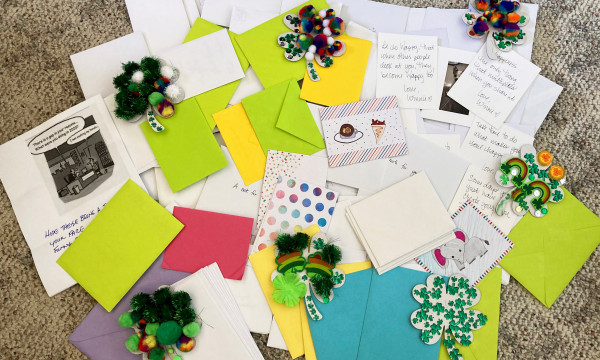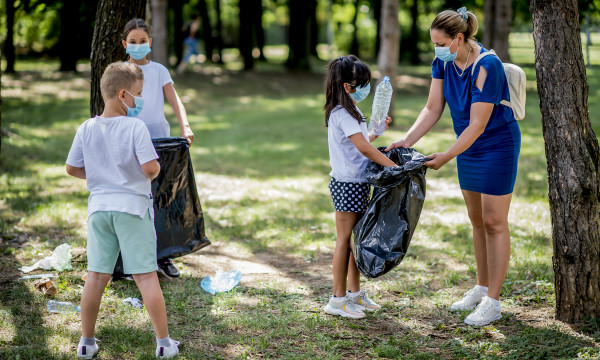The best reasons — and ways — to give back

Doing good just feels good. Wait, who are we kidding? It feels great! There’s an incredible sense of well-being — sometimes even euphoria — that comes from doing something for others. Whether it’s a planned, purposeful effort, like planting trees at the park or walking to End Alzheimer’s, or spur-of-the-moment giving, like “lending” money to someone in line at the grocer’s, or taking time to help an elderly and isolated neighbor, giving of ourselves gives us a sense of purpose. That fulfilling feeling of making a positive contribution to humankind is virtually unparalleled.
Good heart, good health
Beyond making you feel great, studies have shown that giving has a profound effect on one’s physical and mental health. According to Cleveland Clinic, giving can lower blood pressure and stress levels, lessen depression, increase self-esteem, contribute to a feeling of overall happiness and well-being, and even lengthen our life span — talk about making a difference!
All-or-nothing approaches
Sometimes, when it comes to giving, we can allow our philanthropic pendulum to swing too far in one direction or another. Folks often have that “drop in the bucket” syndrome, where they are hesitant to give or act at all for fear it won’t be enough, or conversely, they donate to every appealing cause that crosses their mailbox (or inbox), and volunteer in much the same way. That’s great, if you can do it, but it may not be financially sustainable or even all that fulfilling.
Intentional philanthropy: finding your passion
People are yearning to be asked to use the full measure of their potential for something they care about.Dan Pallotta, Author of The Everyday Philanthropist
Small, random contributions and spur-of-the-moment do-gooding are fantastic. In fact, they’re the basis for being philanthropic in everyday life. We condone do-gooding for all the reasons listed above, and then some. But if you’re experiencing a lack of connection between the monetary contributions you’re making, the impact they’re making, and your own fulfillment, why not select a cause or two that really speak to you as your philanthropic mainstay? Then you can add seasoning in the form of other charitable acts or financial contributions as you are able.
Perhaps there’s a local organization (or several) that you feel strongly about that contributed greatly to the health and well-being of our community during COVID-19, one that is greatly impacting diversity and civil issues, or one that champions another cause that resonates with you. Are environmental issues important to you, or those that impact hunger or poverty? Perhaps you have never met an animal you didn’t like, or feel strongly about supporting at-risk youth.
So very often, our own experiences, or those of family or friends, ignite a passion in us for a particular cause, and over time, those personal losses, experiences, or convictions frame our philanthropic efforts. A small amount of reflection should help identify what cause — or causes — speaks to you.
Find the right match
Once you have identified the “why” and “what,” the “where” is pretty easy; it shouldn’t be tough to find organizations whose mission aligns with your passion. Our community is brimming with excellent nonprofits, and a visit with other like-minded individuals, a quick online search, or a visit to a site like Volunteer Match should point you in the right direction.
When narrowing down your search, you may ask yourself if there’s a community cause that means a great deal to you (there’s far too many to name here, but think Foster Care Closet, Voices of Hope, or Lighthouse). Supporting nationally recognized organizations holds special appeal (the American Cancer Society or American Red Cross come to mind, and there are many more), and there are plenty of familiar, national names that greatly impact local causes and agencies (think United Way of Lincoln and Lancaster County). Again, your values and life experiences will most likely encourage your choices.
Give of your time and talent
Another factor that may color your decision is what it is you’re wanting to give. While some folks let the cause determine their gift, others have a desire to get involved in a specific way. You may want to give of your time and talents, and you’ll most likely find a bevy of takers. When you volunteer using your specific gifts, education, or experience, you’re helping a nonprofit operate on a shoestring budget (aren’t they all?) by offering marketing, financial, or technology resources, or wherever your aptitudes lie. For businesses, this may be as easy as offering your services and allowing your employees time off to volunteer.
Share your treasure
Most nonprofits have a wish list on their website. This is, put simply, stuff they need to keep doing what they do. You may be inspired to organize a drive with family, friends, or co-workers. Whether you collect nonperishables for your local food bank, baby shower items for Head Start, or paper products, personal hygiene items, or cleaning or school supplies for any number of organizations, you can bet there is a need, and your efforts will be appreciated. Don’t forget the women’s and homeless shelters, soup kitchens, or even our beloved animals. Locate that list, and have fun shopping — or even cleaning out the closet or pantry — while helping your community.
Monetary contributions to nonprofits are easier than ever: Most organizations have a secure donation link on their website that makes giving safe and practically effortless by using your credit card, or will allow you to set up consistent automatic payments. For a lasting legacy with an organization that you find particularly impactful, you may consider planned giving. Commonly donated through a will or trust, planned gifts are most often granted once the donor has passed away.
At UBT, we believe it’s particularly important for individuals and organizations to give back and leave the space we inhabit a little better than it was when we got there. We take great pride in working for an organization dedicated to making an investment in the community, and we join in these efforts whenever possible. Volunteering allows you to support causes that are important to you while connecting to your community and learning more about issues affecting it — and giving in any capacity, in addition to being good for you, effects change in you as well as those you serve.
The main thing is to be philanthropic in your everyday life. You don’t have to have money to do that. You can do it with your time and your energy.Eva Longoria
Looking for more on how UBT gives back? Listen to MoneyBetter season 2, episode 2 to hear Angie Muhleisen, President & CEO of UBT, talk about the philosophy that drives UBT’s culture of caring. Meagan Liesveld, United Way, and Mark Feit, Combined Health Agencies Drive (CHAD), also share what’s going on in the community and how their organizations are supporting people in need.
Learning Center articles, guides, blogs, podcasts, and videos are for informational purposes only and are not an advertisement for a product or service. The accuracy and completeness is not guaranteed and does not constitute legal or tax advice. Please consult with your own tax, legal, and financial advisors.




